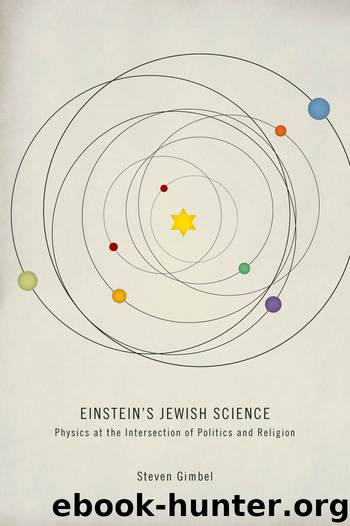Einstein's Jewish Science by Steven Gimbel

Author:Steven Gimbel
Language: eng
Format: epub, mobi
Publisher: Johns Hopkins University Press
Published: 2013-04-08T04:00:00+00:00
CHAPTER FIVE
Did Relativity Influence the Jewish Intelligentsia?
The claim that Einstein’s theory of relativity is “Jewish science” was a Nazi construction, but is it possible that the Jews could own it? While we ordinarily scoff at the phrase “Jewish science,” we have no problem categorizing certain writers throughout history, including contemporaries of Einstein, as Jewish thinkers. There was a vibrant collection of Jewish intellectuals who were wrestling with deep and interesting problems in a fashion that certainly spoke to those beyond the Jewish community but that drew on Jewish thought both as an inspiration and as a source of insight.
Einstein was no stranger to these people. In fact, Martin Buber, perhaps the most famous of them, was a close friend of Einstein’s, so it seems reasonable to ask whether the theory of relativity could be thought of as “Jewish science” in the sense that it was part of the conversation occurring among Jewish intellectuals at the time.
The phrase “Jewish intellectuals,” of course, falls into exactly the problem we examined in chapter 1: who is a Jew? Of the writers at the time, which ones do we count in and which ones do we not? Let’s consider two groups. The first were thinkers who were explicitly wrestling with questions about what it is to be Jewish, those who were part of the movement to reclaim and redefine Judaism. We can contrast them with the second group, prominent scholars of Jewish heritage who would in no sense have called themselves Jewish thinkers, indeed, would not have considered themselves Jewish at all. These are secular thinkers who were completely assimilated but working on deep foundational questions about what it is to have knowledge and how we live as humans.
For the explicitly Jewish thinkers, we’ll see that Einstein was not at all relevant to their examination of Judaism, although they did have an influence on Einstein. For the secular thinkers, Einstein precipitated a rift, the so-called analytic and Continental divide that partitions the philosophical world to this day. It is a deep disagreement concerning the foundations and methodology of philosophy. The analytics see science as the basis for a worldview and use Einstein’s theory and means of reasoning as a template for all thought. Contemporary Continental thinkers, in contrast, saw a totalizing view of science as dehumanizing our picture of the world, something that could have tragic consequences and needed opposition.
WITH ALL OF THE TRADITIONAL ANTI-SEMITIC social structures and institutions in the decades before Einstein, Jews were second-class citizens. Thus liberal politics based on Enlightenment values, according to which all humans are to be considered equal under the law, attracted the loyalty and participation of a large segment of the Jewish community.1 Liberalism allowed Jews economic mobility, some measure of political power, and the chance to pursue fields of study like science, law, and medicine, success in which would demonstrate the equality of Jews with their fellow countrymen.
The liberal worldview is deeply atomistic in that it treats society as a collection of individuals, each of whom looks out for his or her own best self-interest.
Download
This site does not store any files on its server. We only index and link to content provided by other sites. Please contact the content providers to delete copyright contents if any and email us, we'll remove relevant links or contents immediately.
| Africa | Americas |
| Arctic & Antarctica | Asia |
| Australia & Oceania | Europe |
| Middle East | Russia |
| United States | World |
| Ancient Civilizations | Military |
| Historical Study & Educational Resources |
Cecilia; Or, Memoirs of an Heiress — Volume 1 by Fanny Burney(32533)
Cecilia; Or, Memoirs of an Heiress — Volume 2 by Fanny Burney(31931)
Cecilia; Or, Memoirs of an Heiress — Volume 3 by Fanny Burney(31923)
The Secret History by Donna Tartt(19012)
Sapiens: A Brief History of Humankind by Yuval Noah Harari(14355)
Leonardo da Vinci by Walter Isaacson(13302)
The Radium Girls by Kate Moore(12009)
Sapiens by Yuval Noah Harari(5357)
How Democracies Die by Steven Levitsky & Daniel Ziblatt(5207)
The Wind in My Hair by Masih Alinejad(5084)
Homo Deus: A Brief History of Tomorrow by Yuval Noah Harari(4893)
Endurance: Shackleton's Incredible Voyage by Alfred Lansing(4747)
Man's Search for Meaning by Viktor Frankl(4562)
The Silk Roads by Peter Frankopan(4520)
Millionaire: The Philanderer, Gambler, and Duelist Who Invented Modern Finance by Janet Gleeson(4456)
The Rape of Nanking by Iris Chang(4193)
Joan of Arc by Mary Gordon(4088)
The Motorcycle Diaries by Ernesto Che Guevara(4078)
Stalin by Stephen Kotkin(3949)
